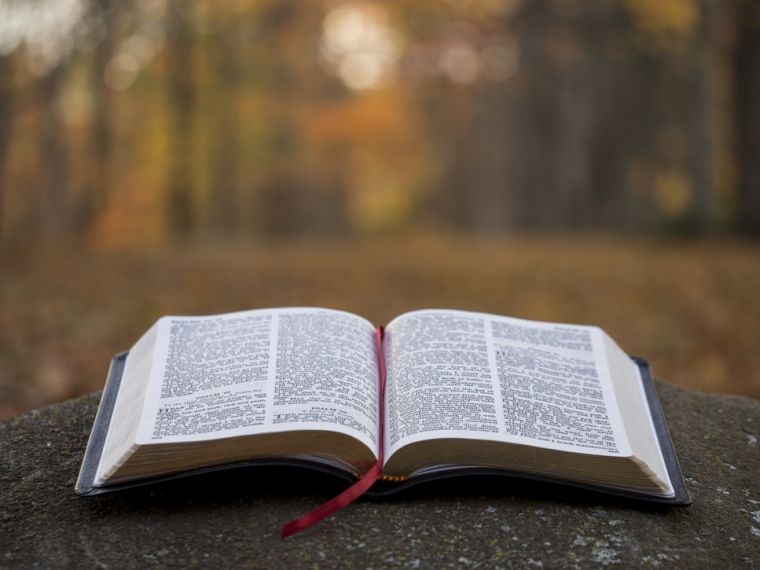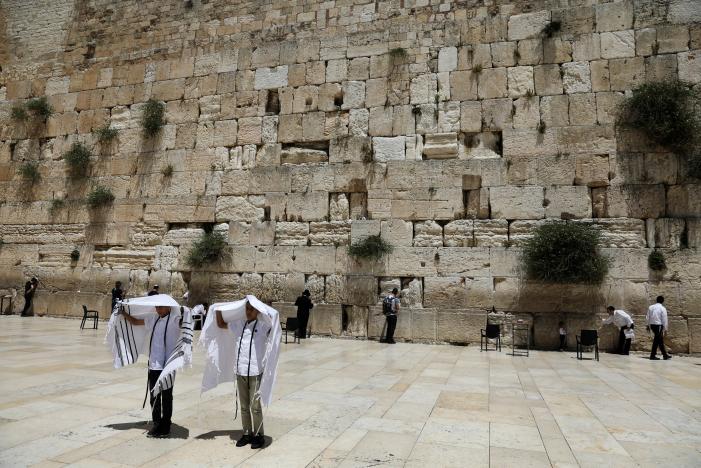This Shabbat before Passover is, for us Jews, about sacrifice and service
This week we celebrate Shabbat Ha Gadol, the great Shabbat heralding Pesach (or Passover). The Lord commands Moses to transmit the Torah (teaching) of sacrifice and service to his brother Aaron, and to Aaron's sons, who will take on the priestly role in Judaism.
What is a divine command? A command is a communication from G-d. Moses is a channel through whom G-d imparts His communication to the tribe of Levi. The tribe of Levi tended to be over-zealous. Their behaviour was henceforth to be contained in the circumscribed role of Temple service involving sacrifice. This function curtailed their inclination to inappropriate action. The priests performed these services in a sacred space and learned through the habit of self-control to become a positive conduit to the divine.

Jewish history was later to demonstrate that the 'priestly' function could be abused and for 2,000 years, since the destruction of the Second Temple by the Roman occupiers of the Land of Israel, The Temple and its priests have been defunct. When the Second Temple was destroyed by the Romans in 70 CE, the 'priestly' role ceased altogether.
300 years before this time however, Hellenistic foreign rulers had begun to mould the Jewish priesthood in their own image. This was the case, for instance, in the time of Jesus. But even well before that, at the time of the Hasmonean dynasty for instance, we can see that study, learning and education of children had replaced the priesthood as the key channel of transmission of Judaism. And it is education that has survived as the key channel of transmission for the last 2,300 years of Jewish history.
Since then people descended from the biblical tribe of Levi are called up first to read from the synagogue bimah (altar) on Shabbat and weekdays. But this is simply a reminder of an historical past and does not mean that anyone called Cohen or Levi is 'better' than anyone else in Judaism, for whom equality of all in the sight of G-d is paramount.
However, the twin concepts of sacrifice and service are still with us and are more important than ever today. For today sacrifice and service are the duty of every one: not simply a means of transmuting impulsive instincts into divine service, but as the key duty of every human being in the egalitarian Jewish communities of the world – the duty of all women, men and children, from the age of 12 in women and 13 in men – marked by the bat and bar mitzvah services, the ritual recognition of coming of age of a Jew.
What exactly is 'service'? This is what this Shabbat's key passages of Leviticus 6-8, read just before Pesach, tell us. Just before we leave the Egypt of our lives – the situation in which we tend to be puffed up and proud (symbolized by chametz – leaven), and eat 'the poor person's bread', the unleavened 'bread of affliction', we are reminded what slavery actually is and what liberation actually becomes. Not simply 'Let my people go', the Exodus chorus of enchained peoples everywhere, but also '... so that they may serve Me'.
It is G-d Himself who wants people to be free to serve Him. An eternal flame will be retained on the altar of the Mishkan (the Tabernacle which symbolizes G-d's indwelling sacred space, later to be rebuilt as the Temple in Jerusalem) – a flame which will never be extinguished. This flame symbolizes that every Jew should become a human sacred space. If a person repents (which is what service is about) it is as if he or she rebuilds themselves anew and recreates this sacred space of themselves.
The Temple in Jerusalem – miraculously since 1967 part of the reality of the Jewish people once again – is nevertheless still not functioning as it once was, and has been replaced by the kitchen table. Where once the sacrifices took place in the Temple, we now educate children and grandchildren while eating together round the table in our homes instead. This table is the link between the Levitical service of Shabbat Ha Gadol and the Pesach meal and Haggadah (retelling the tale of our Exodus from Egypt) which follows a week later.
The Temple is eternal and the Torah demands great vigilance in its upkeep.
One of the original offerings brought to the Temple was the offering of 'thanksgiving'. This is an offering of gratitude to G-d, based on David's Psalm 107. We thank G-d for saving us from the dangers of hazardous journeys, imprisonment, serious illness and sea voyages. These dangers were experienced by the Children of Israel throughout their odyssey from the Egypt of their lives to the Promised Land.
Similar perils have subsequently occurred myriad times in the Land itself, in Diaspora, and in the State of Israel today. Every moment can bring sudden and unexpected dangers of attack, expulsion, and journeys to strange lands. Gratitude is a most important quality and is therefore also regarded as one of the 'peace' offerings to the divine for seeing us safely settled – spiritually, mentally and physically – until the next time around.
Then there is the symbolism of the 40 loaves, 30 of which are unleavened. These 30 remind us of the 'bread of affliction' eaten on Pesach and the oil used for baking symbolizes well-being. The unleavened matzah bread is a rededication to G-d to whom we owe all sustenance which keeps us alive and free of the constrictions symbolized by the leavened bread. Our true state should be the 'bread of affliction' rather than the leaven of ego. The Egypt of leaven is an unnatural state. Our natural state is to be 'poor' and 'humble' and to be constantly aware of our origins as a people always striving against idolatry. Our natural state is also one of gratitude.
The Sages teach that after the coming of the Messiah and the perfection of the world there will be no further need for offerings of atonement, because people will no longer sin. But there will always be thanksgiving offerings of gratitude to the Divine. This teaches the importance of expressing gratitude and in Messianic times, people will continue, as before, to bless G-d.
A very important aspect of the Levitical service is the prohibition against eating blood. Kosher animals must be devoid of blood, which signifies life. Throughout the ages, Jews have been accused of the 'blood libel' – kidnapping small Christian children and eating their blood in the Pesach matzah. And as the libel is still with us today, especially in some parts of Eastern Europe and the Muslim world, it is necessary to point out very strongly that this is a deliberate calumny which started first in England in 1144 with the death of 'Little William of Norwich.' These lies about Jews were followed by similar lies surrounding 'Little Hugh of Lincoln' and Simon of Trent.
The climax of the Levitical service is the 'consecration' offering of the ram. This offering is also known as a 'peace offering'. The Hebrew word for consecration, 'miluim', means 'fulfilment of duty' and is also the word for army service in the State of Israel. Every Israeli citizen, both male and female, must fulfil this duty in order to protect and serve their country, promised to them by G-d, and which is surrounded by enemies who wish her destruction.
In English as well, we use the term the 'armed services' to denote the army, navy and air-force, to which the sovereign and his or her children are inextricably linked. This English tradition of armed service on behalf of the monarch is in direct link with the miluim service in the Temple (and as we will see later, the English coronation service is also linked to the appointment of monarchs in Israel – so well captured by Handel in his many biblical oratorios). And it is based on the Temple service of the Book of Leviticus.

But the 'miluim' service also teaches us something else that is pertinent today. What exactly is peace? Is it simply a cessation of hostilities? Surely that is merely temporary. In order for the peace that we all crave, a citizen's army is deemed in Judaism to be essential. In order for peace to be real and not simply a self-deceiving figment of the imagination, there must be constant preparation for war, and the willingness to fight if necessary to safeguard G-d's precious gifts and blessings.
This is why in the Mishkan, and later in the Temple, preparation for war ('armed service duty') and peace went together in the shape of a ram, the animal which also symbolizes the month of Nisan on whose full moon next week we celebrate Pesach. Not for nothing has 'ram' now become extended in meaning to depict not only the 1st month of the Jewish calendar, but also the ideal of Temple service, army service and many other types of service.
So we should rejoice this pre-Pesach Shabbat to remember that out of the vestiges of the Temple service have emerged the twin ideas of sacrifice and service by all for all; the idea that peace is only possible when we are prepared to risk our lives for it; that we are all equal, not simply as an ideal, but in reality; and that a mature society does not need special human conduits to G-d.
Shabbat Ha Gadol leading to Pesach teaches that poverty, humility and especially the blessing of gratitude are accessible to all of us every day of our life. And this is what we will teach our children and grandchildren around the table during the feast of Pesach. The first vestiges of spring have now appeared, lambs are born, and we celebrate yet again our Exodus from Egypt. In preparing to celebrate with family and friends, we pray that the entire planet of over 7 billion people will learn from our own amazing Jewish history of survival against all the odds – at 14 million, a mere fraction of the global population.
Dr Irene Lancaster is a Jewish academic, author and translator who has established university courses on Jewish history, Jewish studies and the Hebrew Bible.











